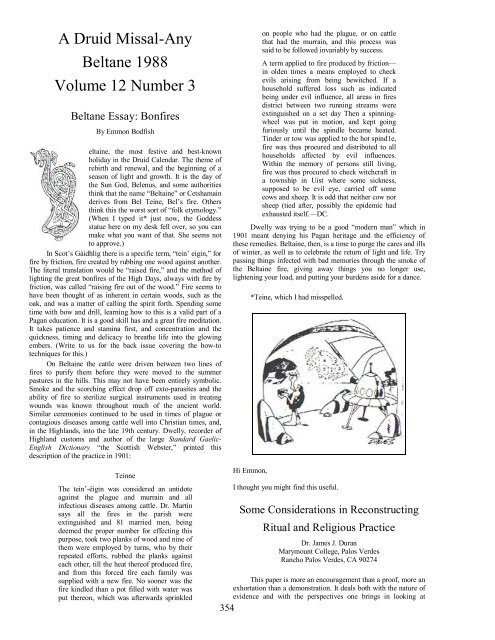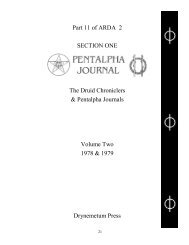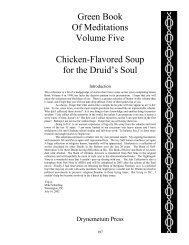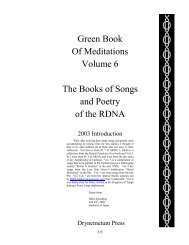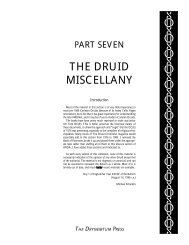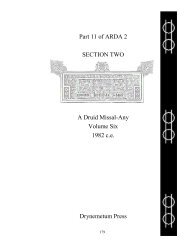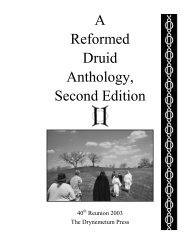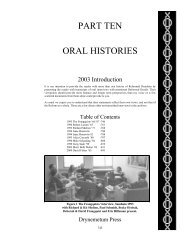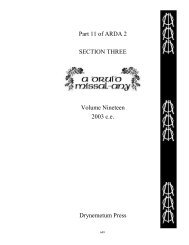Part 11 of ARDA 2 SECTION TWO A - Student Organizations ...
Part 11 of ARDA 2 SECTION TWO A - Student Organizations ...
Part 11 of ARDA 2 SECTION TWO A - Student Organizations ...
You also want an ePaper? Increase the reach of your titles
YUMPU automatically turns print PDFs into web optimized ePapers that Google loves.
A Druid Missal-Any<br />
Beltane 1988<br />
Volume 12 Number 3<br />
Beltane Essay: Bonfires<br />
By Emmon Bodfish<br />
eltaine, the most festive and best-known<br />
holiday in the Druid Calendar. The theme <strong>of</strong><br />
rebirth and renewal, and the beginning <strong>of</strong> a<br />
season <strong>of</strong> light and growth. It is the day <strong>of</strong><br />
the Sun God, Belenus, and some authorities<br />
think that the name “Beltaine” or Cetshamain<br />
derives from Bel Teine, Bel’s fire. Others<br />
think this the worst sort <strong>of</strong> “folk etymology.”<br />
(When I typed it* just now, the Goddess<br />
statue here on my desk fell over, so you can<br />
make what you want <strong>of</strong> that. She seems not<br />
to approve.)<br />
In Scot’s Gàidhlig there is a specific term, “tein’ eigin,” for<br />
fire by friction, fire created by rubbing one wood against another.<br />
The literal translation would be “raised fire,” and the method <strong>of</strong><br />
lighting the great bonfires <strong>of</strong> the High Days, always with fire by<br />
friction, was called “raising fire out <strong>of</strong> the wood.” Fire seems to<br />
have been thought <strong>of</strong> as inherent in certain woods, such as the<br />
oak, and was a matter <strong>of</strong> calling the spirit forth. Spending some<br />
time with bow and drill, learning how to this is a valid part <strong>of</strong> a<br />
Pagan education. It is a good skill has and a great fire meditation.<br />
It takes patience and stamina first, and concentration and the<br />
quickness, timing and delicacy to breathe life into the glowing<br />
embers. (Write to us for the back issue covering the how-to<br />
techniques for this.)<br />
On Beltaine the cattle were driven between two lines <strong>of</strong><br />
fires to purify them before they were moved to the summer<br />
pastures in the hills. This may not have been entirely symbolic.<br />
Smoke and the scorching effect drop <strong>of</strong>f exto-parasites and the<br />
ability <strong>of</strong> fire to sterilize surgical instruments used in treating<br />
wounds was known throughout much <strong>of</strong> the ancient world.<br />
Similar ceremonies continued to be used in times <strong>of</strong> plague or<br />
contagious diseases among cattle well into Christian times, and,<br />
in the Highlands, into the late 19th century. Dwelly, recorder <strong>of</strong><br />
Highland customs and author <strong>of</strong> the large Standard Gaelic-<br />
English Dictionary “the Scottish Webster,” printed this<br />
description <strong>of</strong> the practice in 1901:<br />
on people who had the plague, or on cattle<br />
that had the murrain, and this process was<br />
said to be followed invariably by success.<br />
A term applied to fire produced by friction—<br />
in olden times a means employed to check<br />
evils arising from being bewitched. If a<br />
household suffered loss such as indicated<br />
being under evil influence, all areas in fires<br />
district between two running streams were<br />
extinguished on a set day Then a spinningwheel<br />
was put in motion, and kept going<br />
furiously until the spindle became heated.<br />
Tinder or tow was applied to the hot spind1e,<br />
fire was thus procured and distributed to all<br />
households affected by evil influences.<br />
Within the memory <strong>of</strong> persons still living,<br />
fire was thus procured to check witchcraft in<br />
a township in Uist where some sickness,<br />
supposed to be evil eye, carried <strong>of</strong>f some<br />
cows and sheep. It is odd that neither cow nor<br />
sheep (tied after, possibly the epidemic had<br />
exhausted itself.—DC.<br />
Dwelly was trying to be a good “modern man” which in<br />
1901 meant denying his Pagan heritage and the efficiency <strong>of</strong><br />
these remedies. Beltaine, then, is a time to purge the cares and ills<br />
<strong>of</strong> winter, as well as to celebrate the return <strong>of</strong> light and life. Try<br />
passing things infected with bad memories through the smoke <strong>of</strong><br />
the Beltaine fire, giving away things you no longer use,<br />
lightening your load, and putting your burdens aside for a dance.<br />
*Teine, which I had misspelled.<br />
Teinne<br />
The tein’-éigin was considered an antidote<br />
against the plague and murrain and all<br />
infectious diseases among cattle. Dr. Martin<br />
says all the fires in the parish were<br />
extinguished and 81 married men, being<br />
deemed the proper number for effecting this<br />
purpose, took two planks <strong>of</strong> wood and nine <strong>of</strong><br />
them were employed by turns, who by their<br />
repeated efforts, rubbed the planks against<br />
each other, till the heat there<strong>of</strong> produced fire,<br />
and from this forced fire each family was<br />
supplied with a new fire. No sooner was the<br />
fire kindled than a pot filled with water was<br />
put thereon, which was afterwards sprinkled<br />
354<br />
Hi Emmon,<br />
I thought you might find this useful.<br />
Some Considerations in Reconstructing<br />
Ritual and Religious Practice<br />
Dr. James J. Duran<br />
Marymount College, Palos Verdes<br />
Rancho Palos Verdes, CA 90274<br />
This paper is more an encouragement than a pro<strong>of</strong>, more an<br />
exhortation than a demonstration. It deals both with the nature <strong>of</strong><br />
evidence and with the perspectives one brings in looking at


